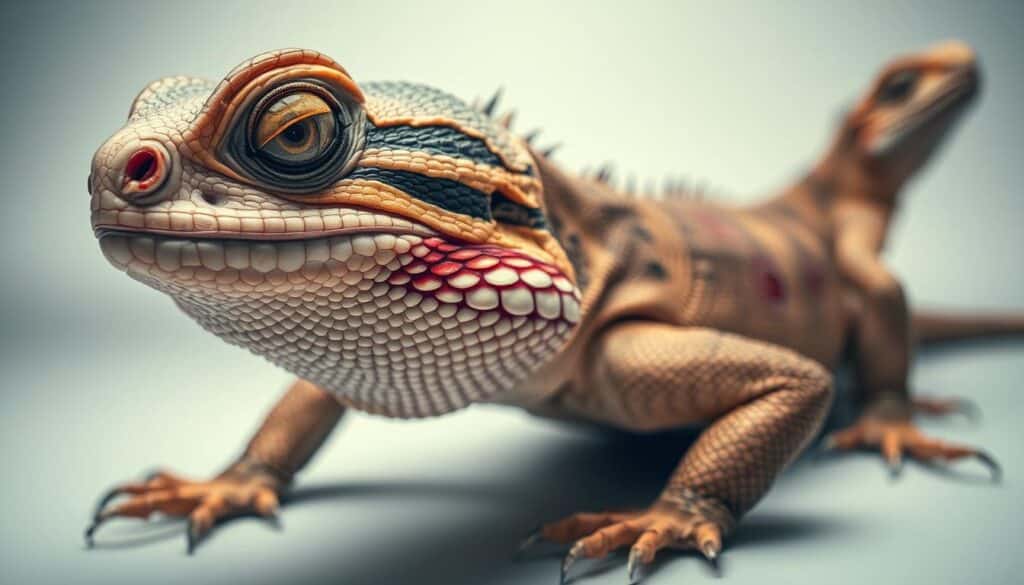Anúncios
Looking after reptiles is fulfilling but complex. It needs careful detail. Keeping them healthy is key. This guide offers vital tips for reptile owners. It covers what to do and not to do for your special pets. By staying clean and knowing what they eat, you help your reptiles stay healthy. Enjoy reptile care by making smart choices to keep them happy and long-lived.
Understanding Reptile Behavior
Understanding reptile behavior is key for any owner who wants a good relationship with their pets. These cold-blooded creatures react a lot to their surroundings. Changes in temperature can affect their energy, mood, and how active they are. Knowing this helps owners take care of their reptiles better.
Some reptiles, like the North American Racer, are very curious and interact with their environment. Watching reptile habits like basking, hiding, and exploring shows us their unique personalities and what they like. This makes their living space better and helps owners and pets bond.
Important behaviors to watch are:
- Basking: It’s crucial for them to get warm and stay healthy.
- Hiding: They hide when they’re scared or want to feel safe.
- Feeding response: How eager they are to eat tells us about their health.
- Activity patterns: Each species has its own times when it’s most active, either during the day or night.
Paying attention to these signs improves our understanding of pet reptile behavior. It also lets owners make the best living environment for their pets.
The Importance of Proper Habitat
Creating the right home for your reptile is very important for its well-being. You need to think about what they need like the right temperature, humidity, and places to hide. These things help them feel like they are in their natural home, keep them active, and stop them from being stressed.
Keeping the temperature just right is crucial. Different reptiles need different levels of warmth. They need a warm spot to bask in and cooler spots to chill out. It’s also key to use a good thermometer to check the temperature.
Humidity is another big thing to think about. Many reptiles live in places that are very wet or very dry, so the amount of moisture in the air is important for their health. Using mist systems or water dishes can help keep the humidity just right.
It’s important to give them enough space too. Reptiles like to move around, explore, and have places where they can hide. Adding different kinds of ground cover, plants, and rocks makes their home more interesting. You also need to clean their home often to keep it safe.
Good habitat care means creating a home that supports your reptile’s natural ways. When you focus on these things, your pet will be happy and healthy. It shows you care about their happiness and health.
Feeding Your Reptile: Dos and Don’ts
Feeding reptiles is not just about giving them food. It’s vital to know what each reptile type needs to stay healthy. They may need live food, frozen treats, or store-bought meals.
Keep these tips in mind when feeding your reptile:
- Find out what specific foods your reptile type needs for a balanced diet.
- Use different foods to prevent nutritional problems. Sticking to just one food type can cause health troubles.
- Make sure to give the right amount of food. Too much or too little can be bad.
It’s common to make mistakes while feeding reptiles, which can harm their health. Many forget to offer a mix of foods. Adding things like bugs, worms, and veggies can make their diet better.
Good nutrition is key to keeping your reptile happy and healthy. Watch for changes in how they eat as it might point to health issues. Checking your feeding routine often will keep your reptile in top shape.
Polish & Scales: The Dos and Don’ts for Reptile Owners
Keeping your reptile’s home clean and healthy is vital. Good cleaning habits can make a big difference to their health, especially with their scales. This part talks about how to clean your reptile’s space. It also covers how to pick safe cleaning products.
Essential Cleaning Practices
Having a cleaning schedule helps avoid sickness and keeps their home comfy. Here are some key cleaning tips:
- Change the ground cover weekly to keep down germs and smells.
- Wipe down their home with warm water and gentle soap. Make sure to rinse off any soap left over.
- Clean decorations and things in their cage, using safe items like vinegar or baking soda.
- Keep an eye on places that get dirty easily. Keeping these areas clean prevents health problems.
What Products to Avoid
Choosing safe cleaning supplies for your reptile matters a lot. Some common cleaners are bad for them. Steer clear of:
- Cleaners with bleach or ammonia. These can be poisonous to reptiles.
- Products with strong smells. They can bother your reptile.
- Anything not clearly marked as safe for animals.
By using safe cleaning methods and the right products, you can make your reptile’s life much better.
Monitoring Health and Wellness
Keeping your reptile healthy means watching them closely. It’s key to spot health problems early on. Regular checks help you know if your reptile is doing well.
Look for these health signs in reptiles:
- Physical appearance, such as shedding, coloration, and scale condition
- Behavioral patterns, including activity level and social interaction
- Eating habits, with attention to food intake and appetite changes
Do these checks often. Make sure you act fast if you see something off. Working with a vet you trust is important. They can do check-ups to prevent sickness.
Common Health Issues in Reptiles
If you care deeply for your reptile pet, knowing about their common health issues is key. Symptoms in sick reptiles can be hard to spot. It’s important to act fast if you notice anything odd. Regular checks on how they act and look help stop serious sickness.
Recognizing Symptoms of Illness
Reptiles show different symptoms when they’re not well. Look out for signs like:
- Lethargy or decreased activity levels
- Changes in appetite or feeding habits
- Abnormal shedding or scale conditions
- Visible weight loss or emaciation
- Difficulty breathing or wheezing
- Unusual swelling or lesions on the body
It’s important for owners to keep an eye out for these signs. Getting help from a vet quickly can really help. This means your reptile can have a better chance at getting well.

Caring for Specific Species
Proper reptile care varies a lot by species. Knowing exactly how to care for each one is crucial for their well-being. Each reptile needs different things like the right home, food, and temperature.
For example, turtles need clean water and places to bask in the sunlight. Snakes require a place with the right amount of moisture. Lizards like places where the temperature changes in different parts.
When looking after your reptiles, keep these points in mind:
- Do lots of research to understand what each reptile needs.
- Look into a reptile care guide for info on setting up their homes.
- Know the unique food requirements of each species.
- Check their health often to catch any problems early.
By taking care of each reptile’s specific needs, pet owners can give them a great place to live. This way, each reptile gets the special care it needs.
Seasonal Care Tips for Reptiles
It’s important to know how seasons affect reptile care. Reptiles depend on the environment to stay warm or cool. In winter, keep their living areas within 75-85°F. Use heat mats or ceramic heaters to keep them warm.
In winter, watch how much they drink. Some reptiles drink less. Always have fresh water ready. You might need misting systems for humidity, especially for tropical ones.
When summer comes, be ready as it gets hotter. Reptiles might want more food and water. Change how often you feed them and keep their water full. Make sure they have shady spots to cool off in their homes.
Some reptiles may sleep through seasons. Check what your reptile needs to sleep safely. Taking care of them all year makes them healthy and happy.
Conclusion
Understanding reptiles is key for any owner. You need to know how to set up their home, feed them right, and watch their health. It’s also important to take good care of their scales. This makes their lives better.
If you’re looking for advice, being proactive and keeping an eye out is crucial. Make sure you clean their space regularly and choose the right products. Learning about how care changes with the seasons and for different types of reptiles will help your pet thrive.
By constantly learning from trustworthy sources, you’ll make great choices for your reptiles. Every step you take creates a better life for these amazing animals. Caring for reptiles is both a rewarding and important journey.



